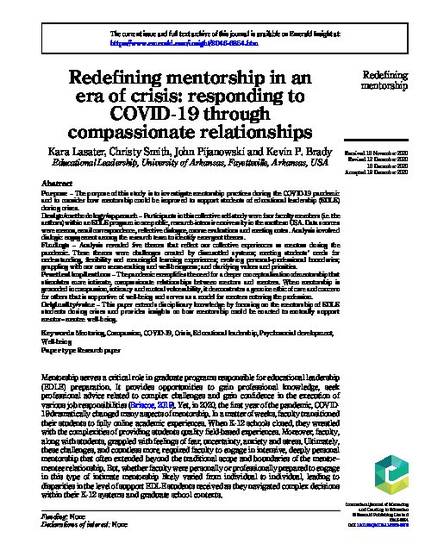
Article
Redefining Mentorship in an Era of Crisis: Responding to COVID-19 through Compassionate Relationships
International Journal of Mentoring and Coaching in Education
(2021)
Abstract
Purpose
The purpose of this study is to investigate mentorship practices during the COVID-19 pandemic and to consider how mentorship could be improved to support students of educational leadership (EDLE) during crises.
Design/methodology/approach
Participants in this collective self-study were four faculty members (i.e. the authors) within an EDLE program in one public, research-intensive university in the southern USA. Data sources were memos, email correspondence, reflective dialogue, course evaluations and meeting notes. Analysis involved dialogic engagement among the research team to identify emergent themes.
Findings
Analysis revealed five themes that reflect our collective experiences as mentors during the pandemic. These themes were challenges created by dismantled systems; meeting students' needs for understanding, flexibility and meaningful learning experiences; evolving personal–professional boundaries; grappling with our own sense-making and well-beingness; and clarifying values and priorities.
Practical implications
The pandemic exemplifies the need for a deeper conceptualization of mentorship that stimulates more intimate, compassionate relationships between mentors and mentees. When mentorship is grounded in compassion, intimacy and mutual vulnerability, it demonstrates a genuine ethic of care and concern for others that is supportive of well-being and serves as a model for mentees entering the profession.
Originality/value
This paper extends disciplinary knowledge by focusing on the mentorship of EDLE students during crises and provides insights on how mentorship could be enacted to mutually support mentor–mentee well-being.
Keywords
- Mentoring,
- Compassion,
- COVID-19,
- Crisis,
- Educational leadership,
- Psychosocial development,
- Well-being
Disciplines
Publication Date
January, 2021
DOI
10.1108/IJMCE-11-2020-0078
Publisher Statement
Emerald allows authors to deposit their AAM under the Creative Commons Attribution Non-commercial International Licence 4.0 (CC BY-NC 4.0). To do this, the deposit must clearly state that the AAM is deposited under this licence and that any reuse is allowed in accordance with the terms outlined by the licence. To reuse the AAM for commercial purposes, permission should be sought by contacting permissions@emeraldinsight.com.
For the sake of clarity, commercial usage would be considered as, but not limited to:
- Copying or downloading AAMs for further distribution for a fee;
- Any use of the AAM in conjunction with advertising;
- Any use of the AAM by for promotional purposes by for-profit organisations;
- Any use that would confer monetary reward, commercial gain or commercial exploitation.
Emerald appreciates that some authors may not wish to use the CC BY-NC licence; in this case, you should deposit the AAM and include the copyright line of the published article. Should you have any questions about our licensing policies, please contact permissions@emeraldinsight.com.
Citation Information
Kara Lasater, Christy Smith, John Pijanowski and Kevin P Brady. "Redefining Mentorship in an Era of Crisis: Responding to COVID-19 through Compassionate Relationships" International Journal of Mentoring and Coaching in Education (2021) ISSN: 2046-6854 Available at: http://works.bepress.com/pijanowski/10/
Creative Commons license

This work is licensed under a Creative Commons CC_BY-NC International License.
